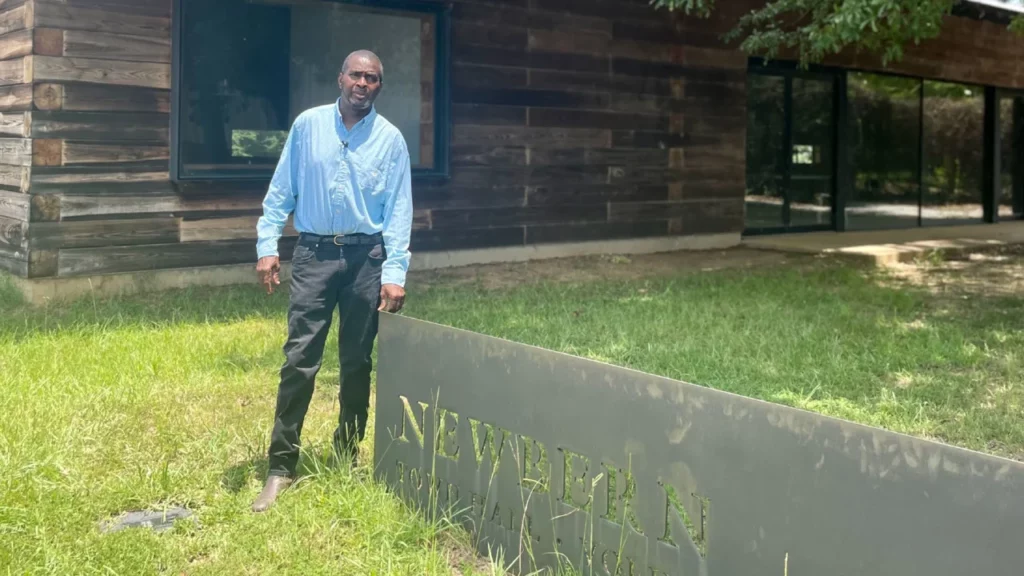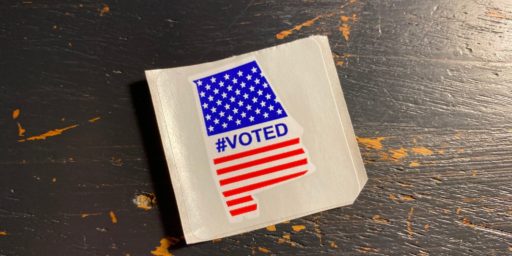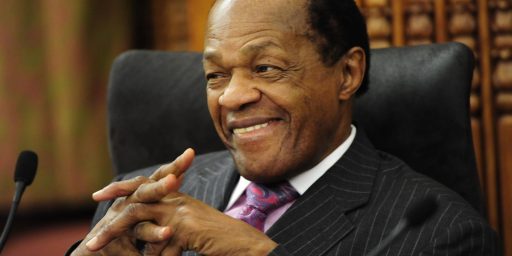The Town Without Elections Redux
Updating the political saga of Newbern, Alabama.

A couple weeks back, Steven Taylor posted about the political crisis in Newbern, Alabama, “The Town Without Elections.” Long story short, the tiny (133 residents as of the 2020 Census) town has been governed for generations by a handful of white families, despite the residents being overwhelmingly Black.
Alas, CNN has an update (“Black mayor of tiny Alabama town says he was ousted by his White predecessor“):
Patrick Braxton accomplished something no Black man in his Alabama town had done in its 166-year history: he became mayor.
He told CNN he ran for office in 2020 to serve the fewer than 300 residents of Newbern, to connect them to help if they didn’t have enough food or to spread information on staying healthy in the Covid pandemic.
And when there were no other declared candidates, he won by default.
But within weeks of his win, and before he got to take his oath of office, Braxton says he was dethroned in a secret scheme orchestrated by the former leadership, who he says did not want to hand over power to a Black mayor who was planning to appoint new council members.
His opponents “set in action a plan to thwart a majority Black City Council from taking office and to effectively prevent the first Black Mayor from exercising the duties and power of his new job,” according to a lawsuit filed by Braxton and the four residents he named as his council.
The lawsuit alleges the locks on the town hall were changed so Braxton could not get in, adding he was denied access to the post office box used for official mail, and a local bank would not let him see the town accounts.
“Patrick Braxton accomplished something no other black resident of the City of Newbern had ever accomplished since the city’s founding in 1854: he was duly elected Mayor of the City,” the lawsuit claims. “However, the minority White residents of the City, long accustomed to exercising total control over city government, refused to accept this outcome.”
Braxton’s allegations are being disputed by the defendants, including Haywood “Woody” Stokes III, the man who was mayor before Braxton and whom the suit alleges became mayor again after a special election Braxton said he knew nothing about.
Stokes did not respond to requests for comment made by CNN in email, phone calls and in person. His fellow defendants also did not answer messages. One of the lawyers representing them and Stokes, Rick Howard, wrote in an email: “We do not comment on pending litigation and refer you to our court filings.”
In those filings, the defendants say there was no conspiracy and no racial discrimination.
In one motion, lawyers for the defendants wrote: “There is no clearly established law regarding what to do when an Alabama town does not hold elections for decades. Based on the allegations of the complaint, the Newbern Defendants certainly could have attempted to rectify the situation by doing exactly what they did, i.e. holding another election, installing legitimate council members, and installing a legitimate mayor pursuant to Alabama law.”
Even as someone long accustomed to the provinciality of small town Alabama, this is just shockingly brazen. Not to mention simply bizarre.
Newbern lies in western Alabama, deep in the agricultural Black Belt named for the dark richness of the soil. It’s about an hour’s drive from Selma, where civil rights marchers were beaten in 1965 as they crossed the Edmund Pettus Bridge, and just 20 minutes west of Marion, where Martin Luther King, Jr. married Coretta Scott and where the shooting death of a church deacon spurred the voting rights movement.
It’s literally in the middle of nowhere —roughly an hour’s drive from Tuscaloosa, Birmingham, or Montgomery. They’re not used to this much attention.
Newbern’s residents live mostly in single-story homes on dead-end streets off State Route 61. Cattle and soybeans are farmed on the surrounding land, and catfish are raised in the nearby lakes.
There’s no stoplight in the town and your lunch options will depend on whether the historic Newbern Mercantile is open. Auburn University’s School of Architecture set up an off-campus studio years ago and its design-build program is evident in an airy library created in a former bank building, a fire station and a community town hall.
Late last month, cobwebs covered the door of the town hall, built from cypress and steel to give what the architects called a “physical and psychological weight to the civic building.”
Occasional passersby demurred when asked if they knew who the town mayor was.
The cobwebs, presumably, are a sign that, functionally, there isn’t a mayor at all.
Contested mayoral elections just haven’t been a part of life here, where public officials tend to serve for decades. Robert Walthall was Newbern mayor for 44 years last century, his daughter Mary Anna Ezell told CNN. She said he never took a paycheck as he looked for ways to upgrade the local water system, and no one ever stood against him so there was never a need for an election.
Walthall was succeeded by council member Paul Owens, who served as mayor for 12 years, an obituary noted. Owens was followed first by Haywood Stokes Jr. and then by Stokes’ son Woody, Ezell recalled. CNN was unable to obtain the dates of service for Newbern mayors.
That’s right peculiar.
Enter Braxton:
Braxton, a lifelong Newbern resident and volunteer firefighter, said he decided to challenge the status quo in April 2020. He asserted in his lawsuit the mayor and town council were not responding to the needs of Newbern’s majority Black community.
He said he communicated his ambition with the sitting mayor, Woody Stokes, the same month. He told CNN Stokes replied Newbern did not have voting machines or ballots, so there could not be an election. “I looked at him like he was crazy,” Braxton said.
The allegation in the lawsuit reads: “Stokes gave Braxton wrong information about how to qualify and what was needed to qualify.” Stokes denied the allegations in a court filing, but agreed Braxton told him of his intention to qualify as a candidate.
Braxton said he consulted with the Alabama Conference of Black Mayors, filed candidacy paperwork and paid the $50 qualifying fee before the deadline.
Both sides agree in their legal filings Stokes did not attempt to qualify as a candidate, and with no other entrants to the race, Braxton won by default.
“I called my wife and called my children and called my mother and spread the news,” said Braxton of the day in July 2020 when he remembers being told by a probate judge and a state trooper he had won.
Braxton says he has been advised by his attorney not to talk about the details of the lawsuit, but he is happy to recall the day. “I was on top of the world,” he told CNN.
You’d think there would be a town charter or some other document setting out when elections are to be held. Whether Braxton was actually “elected” to anything, even by default, seems like legitimately an open question. But, surely, Stokes wasn’t.
Because no one had stood for town council, Braxton said he followed the town precedent and approached residents to gauge if they were willing to be appointed to serve alongside him.
He told CNN he canvassed both White and Black neighbors, but only Black people agreed to work with him.
And that’s when he alleges the dirty tricks really began.
“To prevent Braxton from appointing a majority black Town council, the Defendants … agreed to hold a secret meeting and adopt resolutions to conduct a special election,” the lawsuit alleges.
At the meeting, Braxton’s lawsuit claims Stokes set a special election date for the council, “because the council members had allegedly ‘forgotten’ to qualify as candidates for the 2020 municipal elections.”
Braxton and the people he appointed as councilors say in the lawsuit no notice of a special election was published and the only people to file to run were Stokes and former council members Gary Broussard, Jesse Donald Leverett, Voncille Brown Thomas and Willie Richard Tucker.
And as they were the only candidates for the October 6 special election, they won by default.
But Braxton said he was not told of any changes and continued with his plans. On November 2, he says he and his council were sworn into office and their oaths filed with the office of County Probate Judge Arthur Crawford. “That day was more exciting than when I got the call saying I was the mayor,” Braxton said. “I knew it was official then.”
There’s just no escaping the racial aspect of this, which seems clearly central to the issue. But, more fundamentally, there simply wasn’t a system in place for the town’s residents to choose their leaders. The ruling class just chose from one another.
CNN confirmed with Hale County Braxton did sign the mayoral oath in 2020 and saw a copy of the document. It was the first signed oath received by the records office for Newbern since one from Woody Stokes, dated October 13, 2011, county recording clerk Cynthia Smith said.
Ten days after Braxton was sworn in by a judge, Stokes and his council members “executed an oath of office at the city attorney’s office and filed the oaths with the Probate Judge,” according to the lawsuit. Both sides said the paperwork was filed with Probate Judge Crawford’s office.
But when CNN asked Crawford, who is Black, about the two different sets of oaths, he said: “I’m limited to what I can say as an acting chief elected official.” He hung up when asked for clarification and has not returned messages since.
When Smith sent a copy of Braxton’s oath to CNN, she wrote: “I do not have any other paperwork filed by anyone else.” When reached again about the November 12, 2020, oath by Stokes cited in the lawsuit, she said she had it. But when CNN asked for a copy, she hung up and has not responded since.
Braxton’s lawsuit says Stokes’ ceremony was held at the office of City Attorney William Holmes. When asked about his role in the oath-taking and filing of paperwork, Holmes told CNN: “I would love to discuss this case and the facts with you. However, it is our policy not to discuss pending litigation. Please contact me after the trial and I will be glad to discuss this matter with you.”
Braxton said he didn’t know there had been a special election for a new council when he and his team held a meeting in the town hall late in November – “the one and only meeting they held in the Town Hall as the new majority Black Town government,” the lawsuit claims.
After that meeting, in December, the locks were changed, Braxton alleges. In January 2021, he gained access to the building and had the locks changed again so he could maintain access to the town hall. After that, the lawsuit alleges when Stokes found out Braxton had gained access to town hall, the locks were changed yet again, and Braxton has not had uninterrupted access since April 2021, he alleges.
He says he still tried to do the job of mayor, though he claimed he was not allowed in to assist setting up voting machines for the November 2022 midterm elections – a point disputed by his opponents.
And it wasn’t just access to the town hall. Braxton was also blocked from the town’s bank accounts and official mail, the lawsuit says. In their legal response, Stokes and the others either denied the claims or said they did not have knowledge of them.
There’s more to the story but you get the idea. Again, the whole thing is as bizarre as it is outrageous.






Blows my mind that this could happen in 2023.
I’ve only been to Alabama once, and then I spent the entirety of my time in the relatively safe confines of the The Barber Motorsports Park and Museum.
Quite a contrast, indeed.
@Daryl: For me it’s several visits to Gulf Shores AL, which is pleasant and prosperous. But you don’t have to go very far north from there to see a different country. It seems odd to me that the county and state don’t seem to have weighed in on this situation.
@James, funny how this correlates to you Injustice of Place post.
I read the entire piece, and it’s infuriating. Don’t read it if you suffer from high blood pressure.
Sadly, it’s stories like this that make places like Alabama even more of a joke, with no disrespect intended to our two hosts.
@Daryl: @EddieInCA: Alabama has all manner of problems, to be sure, but this is wildly atypical. I’m reasonably familiar with the major cities, since I got my news from their newspapers and television stations, and spent a lot of time living in Tuscaloosa, Troy (Montgomery area), and Jacksonville (Anniston-Gadsten area). All of those places had standard election practices not dissimilar to what we have here in the affuent DC exurbs of Northern Virginia. But even the smallest of these, Jacksonville, has some 13,000 people and the corresponding institutions. A no-stoplight town with under 200 people functionally a non-entity. I doubt they have a newspaper.
@Sleeping Dog: Oh, for sure.
Apropos of the other post, I’m almost willing to call this town a colony run for the benefit of the minority of white folks.
Free and fair elections?
Try that in a small town.